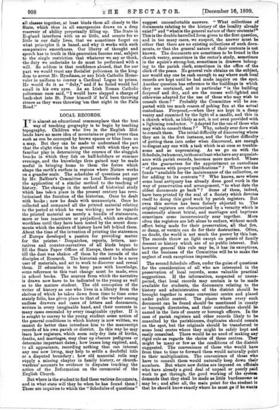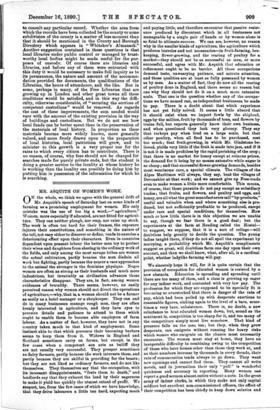LOCAL RECORDS.
IT is almost an educational commonplace that the best way of teaching geography is to begin by teaching topography. Children who live in the English Mid- lands have no more idea of mountains or great rivers than such as can be conveyed by brown spaces or blue lines on a map. But they can be made to understand the part that the slight rises in the ground with which they are familiar play in determining the courses of the sluggish brooks in which they fish on half-holidays or summer evenings, and the knowledge thus gained may be made useful in bringing home to them the forces which shape the earth's surface in regions where Nature works on a grander scale. The schedules of questions put out by Mr. Balfour'e Committee on Local Records suggest the application of a similar method to the teaching of history. The change in the method of historical study IT is almost an educational commonplace that the best way of teaching geography is to begin by teaching topography. Children who live in the English Mid- lands have no more idea of mountains or great rivers than such as can be conveyed by brown spaces or blue lines on a map. But they can be made to understand the part that the slight rises in the ground with which they are familiar play in determining the courses of the sluggish brooks in which they fish on half-holidays or summer evenings, and the knowledge thus gained may be made useful in bringing home to them the forces which shape the earth's surface in regions where Nature works on a grander scale. The schedules of questions put out by Mr. Balfour'e Committee on Local Records suggest the application of a similar method to the teaching of history. The change in the method of historical study which has taken place in the present century has revo- lutionised the function of the historian. Once he dealt with books ; now he deals with manuscripts. Once he collected and compared all the printed material relating to the period at which he was working ; now he regards the printed material as merely a bundle of statements, more or less inaccurate or prejudiced, which are almost worthless until they have been tested by the secret docu- ments which the makers of history have left b-hind them. About the time of the invention of printing the statesmen of Europe developed a passion for providing matter for the printer.• Despatches, reports, letters, nar- ratives and counter-narratives of all kinds began to fill the State Paper Offices of Europe, there to slumber till the dust was shaken off them by the inroads of the disciples of Research. The historian ceased to be a mere user of materials, and set to work to discover and reveal them. If education is to keep pace with knowledge, some reference to this vast change must be made, even in school books. The sources from which the narrative is drawn now have to be indicated to the young as well as to the mature student. The old conception of the writer of history as one who lives in a library from the shelves of which he takes down from time to time some stately folio, has given place to that of the worker among endless drawers and cases of letters and documents, written in every imaginable hand, and their contents in many cases concealed by every imaginable cypher. If it is sought to convey to the young student some notion of the general conditions in which history is now written, we cannot do better than introduce him to the manuscript records of his own parish or district.. In this way he may learn how registers, which seem only dry lists of births, deaths, and marriages, may clear up obscure pedigrees or determine important dates ; how leases long expired, and, to all appearance, recording nothing that can interest any one now living, may help to settle a doubtful title or a disputed boundary ; how old manorial rolls may supply a missing chapter in family history, or church- wardens' accounts be evidence in disputes touching the action of the Reformation on the ceremonial of the English Church.
But where is the student to find these various documents, and in what state will they be when he has found them ? These are inquiries to which the " Schedules of questions" suggest uncomfortable answers. " What collections of documents relating to the history of the locality already exist?" and " what is the general nature of their contents?" This is the double-barrelled form given to the first question, and in too many cases, we suspect, the answer must be either that there are no existing collections of such docu- ments, or that the general nature of their contents is not known. The documents are sometimes to be found in the church vestry, sometimes in the rector's study, sometimes in the squire's strong-box, sometimes in drawers belong- ing to the parish clerk, sometimes in the office of the clerk of the peace. No general rule obtains on the subject, nor would any one be rash enough to say where such local records are kept until he had made inquiry on the spot. Another question has reference to the buildings in which they are contained, and in particular " is the building fireproof and dry, and are the rooms well-lighted and otherwise adapted for the use of those who may wish to consult them ? " Probably the Committee will be sus- pected with too much reason of poking 'fun at the actual custodians. Fireproof, —when they are kept in a damp vestry and examined by the light of a candle, and this in a church which, as likely as not, is not even provided with a lightning conductor. " Adapted for the use of those who may wish to consult them ?" Why, nobody ever does wish to consult them. The initial difficulty of discovering where they are in the first instance, and the further difficulty of getting them into order when discovered, are enough to disgust any one with a task which is at once so trouble- some and so unpromising. As we go on with the Schedule, its humour, to those atleast who have any acquaint- ance with parish records, becomes more marked. Where are the guarantees for the appointment as custodians " of persons with proper qualifications" ? Where are the funds "available for the maintenance of the collection or for adding to its contents " ? Who knows, save where some local antiquary has already done good work in the way of preservation and arrangement, "to what date the oldest documents go back" ? Some of them, indeed, have been printed by the zeal of a Society which devotes itself to doing this good work by parish registers. But even this service has been fiercely objected to. The original registers are characterised by a veracity which is occasionally almost brutal, and marriages and baptisms sometimes come inconveniently near together. More often the registers are left alone to endure, without much effort being made for their preservation, all that fire, or damp, or vermin can do for their destruction. Often, no doubt, the world is not much the poorer by this loss. The records throw no light except on points of family descent or history which are of no public interest. But however general this rale may be, it has its exceptions, and the business of the Committee will be to make the neglect of such exceptions impossible.
The second Schedule offers, under the guise of questions for the consideration of all who are interested in the preservation of local records, some valuable practical suggestions. If the information, suspected or unsus- pected, that local records may contain is to be made available for students, the documents relating to the history and administration of the district should be brought together in some convenient centre and placed under public control. The places where every such document can be found should be mentioned in county or borough directories, and their custodians should be named in the lists of- county or borough officers. In the case of parish registers and other records likely to be consulted by the parishioners, duplicates should remain on the spot, but the originals should be transferred to some local centre where they might be safely kept and easily consulted. There would be no need of making any rigid rule as regards the choice of these centres. They might be many or few as the conditions of the district suggested. The convenience of those who would have from time to time to forward them would naturally point to their multiplication. The convenience of those who have to consult them would naturally keep down their numbers. But where new duties are imposed on officials who have already a good deal of unpaid or poorly paid work to get through, the good working of the system demands that they shall be made as little burdensome as may be ; and after all, the main point for the student is that he should know exactly where he must go if he wants
to consult any particular record. 'Whether the area from which the records have been collected be the county or some subdivision of the county is a matter of less moment than that it should be mentioned in the County and Borough Directory which appears in " Whitaker's Almanack." Another suggestion contained in these questions is that local libraries under public control or managed by trust- worthy local bodies might be made useful for the pur- poses of custody. Of course there are libraries and libraries, and before any of them were entrusted with this duty it would be necessary to make full inquiry as to its permanence, the nature and amount of the accommo- dation provided for documents, the qualifications of the Librarian, the hours of attendance, and the like. But in some, perhaps in many, of the Free Libraries that are growing up in London and other great towns all these conditions would be satisfied, and in this way the diffi- culty, otherwise considerable, of " securing the services of competent custodians" would be removed. As regards the cost of these improvements, the sum needed would vary with the amount of the existing provision in the way of buildings and custodians. But we do not see how local funds can be better spent than in the preservation of the materials of local history. In proportion as these materials become more widely known, more generally valued, and more freely drawn upon in the preparation of local histories, local patriotism will grow, and to minister to this growth is a very proper use for the rates to which every citizen has to contribute. There is no reason, of course, why fees should not be charged for searches made for purely private ends, but the student is doing a greater service to the locality at whose history he is working than the locality can possibly be doing him by putting him in possession of the information for which he is searching.











































 Previous page
Previous page